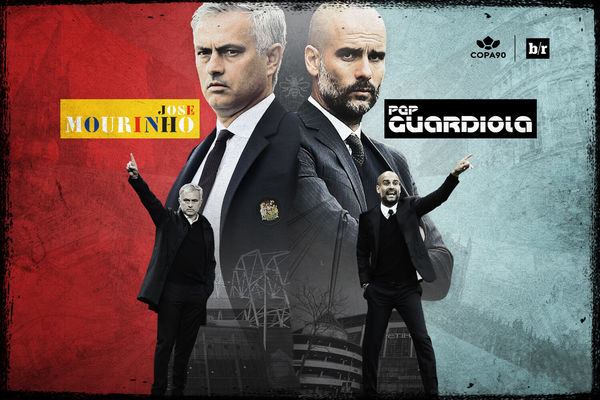Jose Mourinho pictured at Old Trafford before Manchester United's Premier League game against Southampton.
Mark Bent is 43 and has watched City home and away since childhood, growing up in Davyhulme, a predominantly United-supporting area three miles to the west of Old Trafford.
Mark went to Gillingham and Colchester when City were in England's third tier the year United won the treble; he went to every European away game when City climbed back to the top. He never gloated, never talked ill of United, never became bitter. Mark Bent just supported his team, Manchester City.
He saw downs and the odd up, watched City play at 73 of England's 92 league grounds. He only ever lost patience once, when the City team he'd gone to see in a game in Groclin, Poland, ignored fans as they returned to the plane after midnight. That was November 2003. City finished 16th that season, yet their average home crowd of 46,834 was still the third highest in England's Premier League.
A new stadium, built for Manchester's 2002 Commonwealth Games, helped. But angered over events in Groclin, Mark Bent quit going to away games for a year.
He was soon back; it was in his blood. Mark's granddad John had watched City at their first home, Hyde Road, which they left for Maine Road in 1923. Mark's dad Albert is from Hulme, a working-class inner-city area equidistant between Old Trafford and Maine Road. It wasn't unusual, as it would be now, for those of his generation and class to watch United one week and City the next, but Albert favoured City. He was at Wembley in 1956 when their German ex-POW goalkeeper Bert Trautmann broke his neck.
Mark got his first season ticket in 1982-83.
"I started going in the year we got relegated by Luton," he says. Luton's cream-suited manager David Pleat ran across the Maine Road pitch, in cream slip-on shoes. Luton were up, City were down. It's an image which delights older United fans, who loved seeing City suffer.

Manchester City host Charlton in a Division Two match at Maine Road in May 1985. City won 5-1 to return to the top flight.
Not that United fans had so much to gloat about in the 1980s. The team went through two full decades without being champions of England, yet following the arrival of Alex Ferguson in 1986, United returned to the top of the football tree. Ferguson, who won United's first league title for 26 years in 1993, would win so many titles that United surpassed Liverpool's 18-trophy haul.
I'm a United fan who started the fanzine United We Stand in 1989 while at school. Mark sat next to me in the classroom—two football-mad 15-year-olds. That's normal in Manchester, where football matters. Really matters.
More people watch live football in Manchester than in any other two-team city in the world. More than Madrid, Munich and Milan. United's home average attendance was 75,329 in 2015-16; City's 54,041. United were the third-best supported team in world football after Borussia Dortmund and Barcelona, City eighth. United's average would have been first had Old Trafford been bigger.
Manchester is more than two clubs, though. Wigan Athletic, Bolton Wanderers, Rochdale and Bury make up the professional teams of Greater Manchester. There are another score of semi-professional clubs, six in England's sixth division alone, including Stockport County, whose team beat Manchester City in a league game when they last met in 2002.
Within an hour's car journey from Manchester you'll find Oldham, Everton, Liverpool, Tranmere, Chester, Wrexham, Blackburn Rovers, Burnley, Blackpool, Accrington Stanley, Preston North End, Fleetwood, Leeds United, Bradford City, Huddersfield Town, Crewe Alexandra, Stoke City, Morecambe, Macclesfield Town and Port Vale. There's not an area in world football with so many professional clubs in such proximity.
Within a month of his arrival, Guardiola would be describing Manchester to friends as a city addicted to football.
Mark and I seldom speak about football. He's blue, I'm red. We know where we stand. And that's that. The rules were never written or discussed, but his seven-year-old son Braydondoesn't subscribe to them one bit.
Last seen riding in a Mancunian black cab with Guardiola, Braydon, like Pep, represents a bold new future for City.






